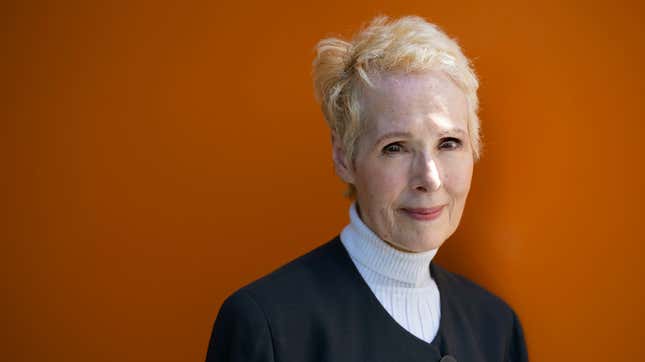

On Thursday, E. Jean Carroll, the long-time advice columnist who last week alleged that Donald Trump raped her in 1996 in a dressing room at Bergdorf Goodman in New York City, appeared on an episode of the New York Times podcast The Daily. Alongside her, and speaking publicly for the first time, were Lisa Birnbach and Carol Martin, the two women Carroll spoke with shortly after the alleged sexual assault occurred.
Carol Martin is a former television anchor, and at the time of the alleged attack, she and Carroll were hosting shows on the same network. Lisa Birnbach is a writer who that year had written a splashy New York magazine cover story about Donald Trump and Mar-a-Lago. “I think my story is one of the reasons you thought to call me,” Birnbach says on the podcast. “That is a high possibility, but I don’t remember,” Carroll replies.
What Carroll does remember, as she detailed in the excerpt of her book that was published by New York magazine last week, is many of the details of that night.
As she recalls it, the evening began playfully: “I am just having such an engaging time because I have Donald Trump in tow, and he is asking for my advice, and I’m thrilled this is happening,” Carroll remembered.
“Why are you so thrilled?” Megan Twohey, an investigative reporter for the Times, asks her.
“Cause it’s Donald Trump, it’s a thing! It is a thing,” Carroll replied. “It’s like, it’s just delicious, because he stopped me, he’s asking for my advice, it’s for a girl, right up my alley. I’m just thinking, this is it.”
Her essay in New York magazine was excruciating to read, but hearing her describe the evening in her own voice—the way she recounts what happened so matter-of-factly—was gut-wrenching.
“I pass in front of him, he shuts the door, and just pushes me against the wall. Boom. And kissed me,” she explained. “And I was continuing to laugh, and that’s when I started to push him back, and that’s when he started to lean forward, and that’s when he put his weight against me.”
She continued: “Pretty soon he had the tights down, his penis in this hand, and inserted it briefly. I don’t think it was all the way. I don’t.”
Carroll called Birnbach almost immediately after, she said. Birnbach, who was home with her children at the time, recalled that Carroll was “breathless” and “laughing” at first. “I remember her saying repeatedly, he pulled down my tights,” she said, which made her think that this was the extent of what happened. Birnbach at first was laughing along, but she soon stopped when Carroll told her that Trump had forced his penis inside of her: “And I said, what, he raped you?”
Birnbach encouraged her to go to the police, which Carroll was reluctant to do. On the podcast, Carroll said she didn’t see the attack at the time as a crime, and felt she had responsibility for what happened—“100 percent,” in her words.
A few days later, Carroll told Martin of the alleged rape. “I said don’t tell anybody. I wouldn’t tell anybody this,” Martin said. After these two conversations, the three never spoke of it again.
When asked why she didn’t tell her story in the lead-up to the 2016 elections, Carroll had this to say: “Shocking as it sounds, I thought it would help him. And shocking as it sounds, I was correct.” She continued: “Because it was a masculine, powerful, leader-like thing to do to take what you want, to have as many women for your own pleasure as you can take.”
Carroll herself has not described what she says happened as rape, and she explained her reasoning:
Every woman gets to choose her word. Every woman gets to choose how she describes it. This is my way of saying it. This is my word. My word is fight. My word is not the victim word. I have not been raped. Something has not been done to me. I fought. That’s the thing.
Towards the end of the interview, Carroll is asked if she thinks her allegations will change anything. Her response is devastating, familiar, and very likely true: “I have no expectations,” she explained. “I have learned as a woman of 76 years to have absolutely no expectations, because if you have even a half of an expectation, you will be disappointed. So I have no expectation.
Survivors of sexual violence may see a version of their own reactions in all of this: the initial response of laughing it off and Carroll’s low—yet all too realistic— expectations of the impact of her sharing her account. It’s a way to guard your own dignity—making the story, and by extension yourself, small as a way to minimize what you know will occur once it’s out there in the world. That often comes with disbelief, questioning, brushing aside. How else can you bear it otherwise?